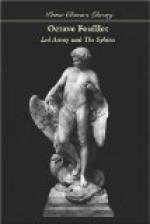He had been, moreover, agreeably surprised at the beauty of Madame de Moras, which was indeed striking. The severe regularity of her features, the deep luster of her blue eyes fringed with long black lashes, the exquisite harmony of her form were not her only, nor indeed her principal attractions; she owed her rare and personal charm to a sort of strange grace mingled with flexibility and strength, that lent enchantment to her every motion. She had in the play of her countenance, in her step, in her gestures, the sovereign ease of a woman who does not feel a single weak point in her beauty, and who moves, grows, and blossoms with all the freedom of a child in his cradle or a fallow deer in the forest. Made as she was, she had no difficulty in dressing well; the simplest costumes fitted her person with an elegant precision that caused the Baroness de Pers to say in her inaccurate though expressive language:
“A pair of kid gloves would be enough to dress her with.”
During that same day and those that followed, Julia conquered new titles to Monsieur de Lucan’s good graces, by manifesting a strong liking for the chateau of Vastville and the surrounding sites. The chateau pleased her for its romantic style, its old-fashioned garden ornamented with yews and evergreens, the lonely avenues of the park, and its melancholy woods scattered with ruins. She went into ecstasies at the sight of the vast heather plains lashed by the ocean winds, the trees with twisted and convulsive tops, the tall granite cliffs worn by the everlasting waves.
“All that,” she said, laughingly, “has a great deal of character;” and as she had a great deal of it herself, she felt in her element. She had found the home of her dreams, she was happy.
Her mother, to whom she paid up in passionate effusions all arrearages of tenderness, was still more so.
The greater part of the day was spent riding about on horseback. After dinner, Julia, with that joyous and somewhat feverish spirit that animated her, related her travels, parodying in a good-natured manner her own enthusiasm and her husband’s relative indifference in presence of the masterpieces of antique art. She illustrated these recollections with scenes of mimicry in which she displayed the skill of a fairy, the imagination of an artist, and sometimes the broad humor of a low comedian. In a turn of the hand, with a flower, a bit of silk, a sheet of paper, she composed a Neapolitan, Roman, or Sicilian head-dress. She performed scenes from ballets or operas, pushing back the train of her dress with a tragic sweep of her foot, and accentuating strongly the commonplace exclamations of Italian lyricism:
“Oh, Ciel! Crudel! Perfido! Oh, dio! Perdona!”
Or else, kneeling on an arm-chair, she imitated the voice and manner of a preacher she had heard in Rome, and who did not seem to have sufficiently edified her.
Through all these various performances she never lost a particle of her grace, and her most comical attitudes retained a certain elegance.




